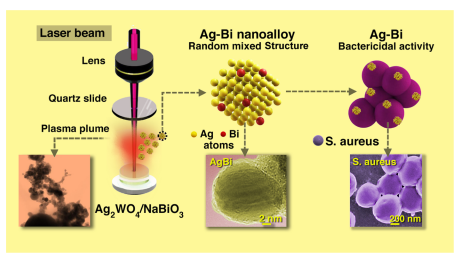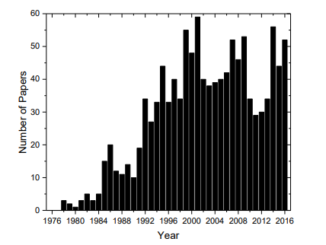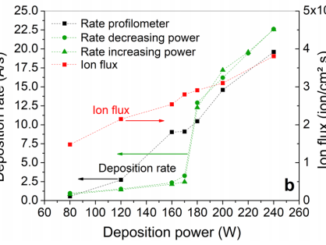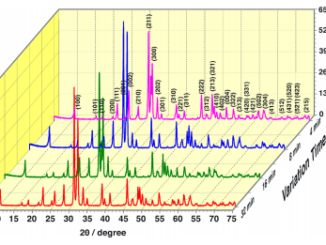
From Complex Inorganic Oxides to Ag-Bi Nanoalloy: Synthesis by Femtosecond Laser Irradiation
Abstract: Bimetallic nanoalloys with a wide variety of structures and compositions have been fabricated through many diverse techniques. Generally, various steps and chemicals are involved in their fabrication. In this study, the synthesis of Ag-Bi nanoalloys by femtosecond laser irradiation of an inorganic oxide Ag2WO4/NaBiO3 target without any chemicals like reducing agents or solvent is presented. The interaction between these materials and the ultrashort pulse of light allows the migration of Ag and Bi atoms from the crystal lattice to the particles surfaces and then to the plasma plume, where the reduction of the positively charged Ag and Bi species in their respective metallic species takes place. Subsequently, the controlled nucleation and growth of the AgBi alloyed nanoparticles occurs in situ during the irradiation process in air. Although at the bulk level, these elements are highly immiscible, it was experimentally demonstrated that at nanoscale, the AgBi nanoalloy can assume a randomly mixed structure with up to 6 +/- 1 atom % of Bi solubilized into the face-centered cubic structure of Ag. Furthermore, the Ag-Bi binary system possesses high antibacterial activity against Staphylococcus aureus (methicillin-resistant and methicilin-susceptible), which is interesting for potential antimicrobial applications, consequently increasing their range of applicability. The present results provide potential insights into the structures formed by the Ag-Bi systems at the nanoscale and reveal a new processing method where complex inorganic oxides can be used as precursors for the controlled synthesis of alloyed bimetallic nanoparticles.
Author(s): Machado, TR; Macedo, NG; Assis, M; Donate-Buendia, C; Minguez-Vega, G; Teixeira, MM; Foggi, CC; Vergani, CE; Beltran-Mir, H; Andres, J
ACS OMEGA
Volume: 3 Pages: 9880-9887 Published: AUG 2018
PDF: From Complex Inorganic Oxides to Ag-Bi Nanoalloy Synthesis by Femtosecond Laser Irradiation
DOI: 10.1021/acsomega.8b01264




